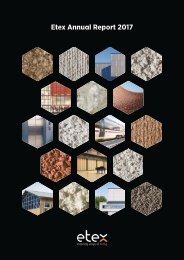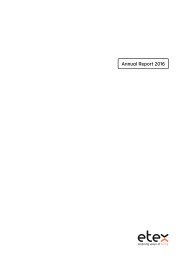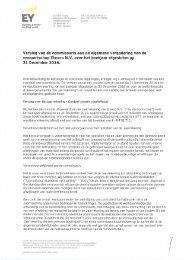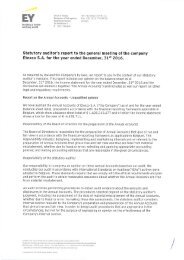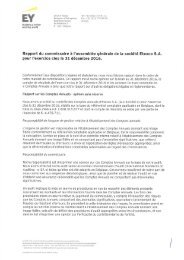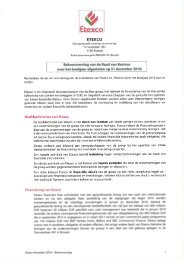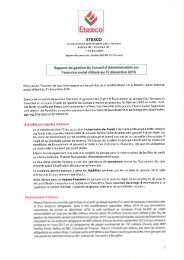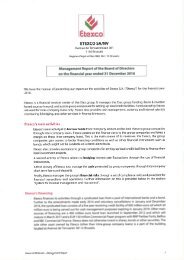ETX-10829_Etex-AR2017_WEB_2018_DEF2 (2)
Create successful ePaper yourself
Turn your PDF publications into a flip-book with our unique Google optimized e-Paper software.
6.1<br />
Financial report<br />
Consolidated financial statements<br />
<strong>Etex</strong> Annual Report 2017<br />
Financial report<br />
Consolidated financial statements<br />
The following tables reconcile the funded and unfunded status of defined benefit plans to the amounts recognised in the statement of<br />
financial position:<br />
In thousands of EUR 2016 2017<br />
Present value of funded obligations 1,392,281 1,280,032<br />
Fair value of plan assets 1,153,411 1,128,347<br />
Plan (surplus) deficit of funded obligations 238,870 151,685<br />
Present value of unfunded obligations 142,721 128,700<br />
Net liability from funded and unfunded plans 381,591 280,385<br />
Other long term benefits 6,103 5,534<br />
Termination benefits 3,038 4,502<br />
Stock option plans 8,547 14,966<br />
Net employee benefits liability 399,279 305,387<br />
Defined benefit obligation 1,552,689 1,433,735<br />
Fair value of plan assets 1,153,411 1,128,347<br />
Net liability at the end of the year 399,278 305,388<br />
Net employee benefits liability (assets) 399,278 305,388<br />
Employee benefits in the statement of financial position:<br />
Liabilities 399,278 310,731<br />
Assets - 5,343<br />
Funded pension plans have been established in the United Kingdom, Ireland, Germany, Belgium, the Netherlands, Indonesia and Brazil.<br />
They are all closed for new employees.<br />
Unfunded pension plans exist mainly in Germany and Chile, but also in Japan and Lithuania.<br />
Other post employment benefits such as medical plans, early retirement plans and gratuity plans are granted mainly in Belgium, the<br />
United Kingdom, France, Germany, Austria and Italy. Other long term benefits consist mainly of “Jubileum” premiums in Germany and<br />
Poland. In France it relates to long term profit sharing and “Medailles du travail”.<br />
Termination benefit plans consist of specific early retirement plans, mainly in Germany and Chile.<br />
Stock options plans are detailed in note 22.<br />
The largest individual plans are in UK and Ireland. Together they account for 80% (82% in 2016) of the total Group defined benefit<br />
obligation, and 92% (93% in 2016) of its plan assets.<br />
UK Pension Plans<br />
funding level of the Plans. Other assumptions used to value the defined benefit obligation are also uncertain.<br />
Other risks such as actions taken by the local regulators could result in stronger local funding standards, which could affect cash flow.<br />
However, because the UK sponsor has a right to a refund of any surplus assets, there would be no further balance sheet effect.<br />
In order to mitigate risk and working together with the Trustees, the UK sponsors have carried out two risk management exercises since<br />
the closure of the Plans. The first of these was a pension increase exchange exercise whereby members of the Plans were offered the<br />
opportunity to exchange non-statutory inflation linked pension increases for a higher initial pension thereby reducing the inflation<br />
exposure of the Plans. A flexible pension option exercise took place at the end of 2013/start of 2014 in which preserved pensioners aged<br />
55 or over were reminded of their option to retire early or transfer out of the Plans with the offer of independent financial advice. To the<br />
extent members decide to transfer out of the Plans some of the risks described are reduced.<br />
Ireland Pension Plans<br />
In Ireland, the Group sponsors two defined benefit pension plans – The Tegral Group Pension Plan (the “Main Plan”) and the Tegral<br />
Group Executives Pension Plan (the “Exec Plan”) together (“the Plans”). The Plans were closed to future accrual on 31 December 2010<br />
at which point all active members were granted preserved benefits in the Plans with ongoing pension provision via a separate company<br />
sponsored defined contribution pension scheme (the DC Scheme).<br />
The Plans target a pension paid for life. The amount of pension depends on how long employees were active members of the Plans and<br />
their salary when they left the Plans, revalued on a statutory basis until retirement.<br />
The Plans are governed by boards of Trustees (the “Trustees”) that have control over the operation, funding and investment strategy.<br />
The Trustees are comprised of nominees of the sponsoring employers and elected members of the Plans. The Trustees work together<br />
with the Irish sponsoring employer of the Plans (the Irish sponsors).<br />
Irish legislation requires the Trustees to carry out valuations according to local funding requirements at least every three years. The most<br />
recent valuations were carried out as at 1 January 2015 and the next formal actuarial valuation of the Plans will be as of 1 January <strong>2018</strong>.<br />
The combined approximate weighted average duration of the defined benefit obligation is 18 years for the Plans.<br />
The Plans hold a diversified portfolio of assets including equities, bonds, property, cash and absolute return funds. The investment<br />
strategy is reviewed regularly by the Trustees in conjunction with the Irish sponsors.<br />
There is a risk that experience being different to the assumptions for investment return, price inflation or life expectancy could result in<br />
deterioration in the funding level of the Plans. Other assumptions used to value the defined benefit obligation are also uncertain, although<br />
their effect is less material.<br />
Other risk such as actions taken by the local regulators could result in stronger local funding standards, which could affect cash flow.<br />
However, because the sponsor has a right to a refund of any surplus assets, there would be no further balance sheet effect.<br />
In order to mitigate this risk and working together with the Trustees, the Irish sponsors have controlled risk by closing the Plans to future<br />
accrual and reducing the investment risk of the Plans.<br />
In the UK, the Group sponsors two defined benefit pension plans – the Marley 1986 Scheme (the “Scheme”) and the Eternit Pension Plan<br />
(the “Plan”, together “the Plans”). The Plans were closed to future accrual on 31 December 2009 at which point all active members were<br />
granted preserved benefits in the Plans with ongoing pension provision via a separate company sponsored defined contribution pension<br />
scheme.<br />
The Plans target a pension paid for life. The amount of pension depends on how long employees were active members of the Plans and<br />
their salary when they left the Plans, revalued on a statutory basis until retirement.<br />
The Plans are governed by boards of Trustees (the “Trustees”) that have control over the operation, funding and investment strategy.<br />
The Trustees are comprised of nominees of the sponsoring employers and elected members of the Plans. The Trustees work together<br />
with the UK sponsoring employers of the Plans (the UK sponsors).<br />
UK legislation requires the Trustees to carry out valuations according to local funding requirements at least every three years and to<br />
target full funding against a basis that prudently reflects the Plans’ risk exposure. No contributions are currently being paid in respect of<br />
the deficit in the Scheme as this deficit is expected to be eliminated by the Scheme achieving investment returns in excess of the<br />
discount rate used to set the liabilities.<br />
The formal actuarial valuation of the Plans at 31 March 2017 is underway and expected to be complete in June <strong>2018</strong>. The next formal<br />
valuation of the Plans will be dated 31 March 2021.<br />
The approximate weighted average duration of the defined benefit obligation is 17 years for the Scheme and 18 years for the Plan.<br />
The Plans hold a diversified portfolio of assets including equities, absolute return funds, emerging market debt, property, buy and hold<br />
credit funds and cash. The investment strategy is reviewed regularly by the Trustees in conjunction with the UK sponsors.<br />
There is a risk that changes in the assumptions for investment return, price inflation or life expectancy could result in deterioration in the<br />
<strong>Etex</strong> Annual Report 2017 p. 47<br />
<strong>Etex</strong> Annual Report 2017 p. 48<br />
142 143



